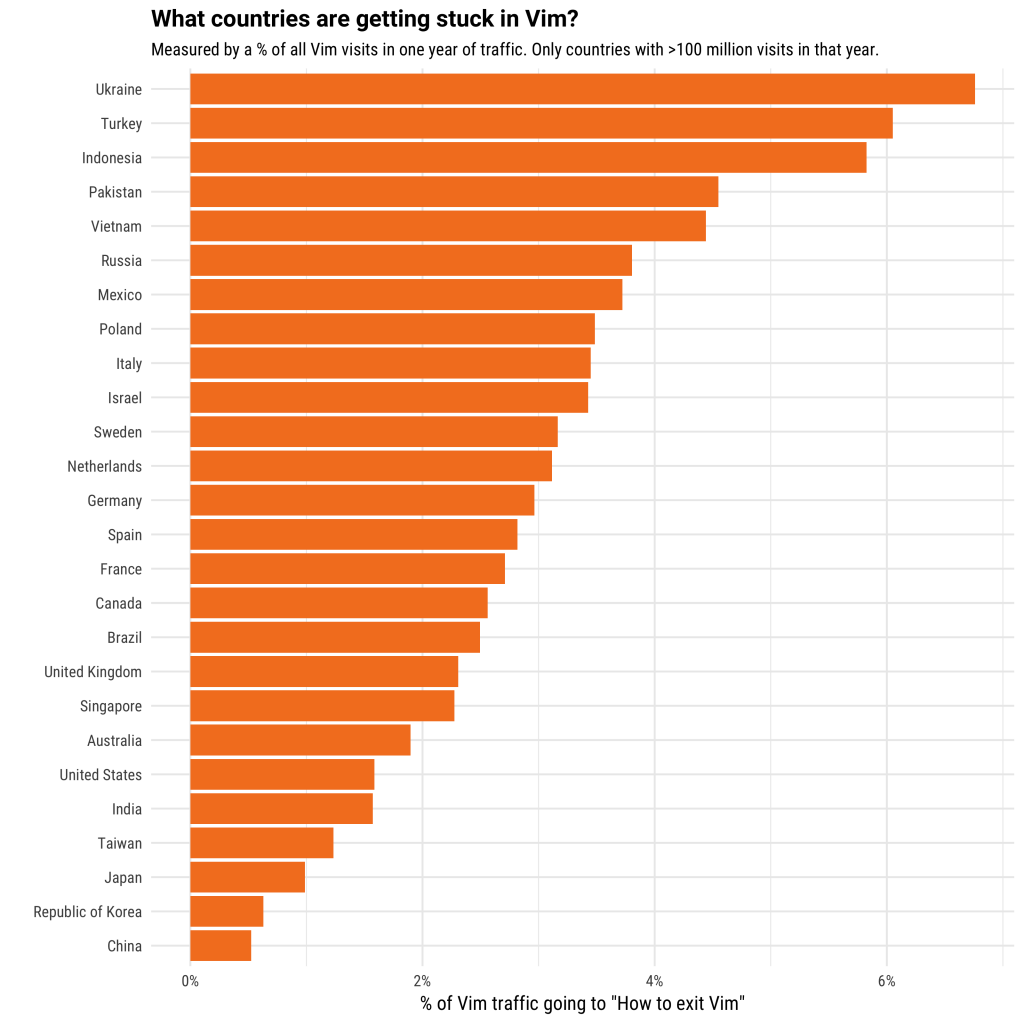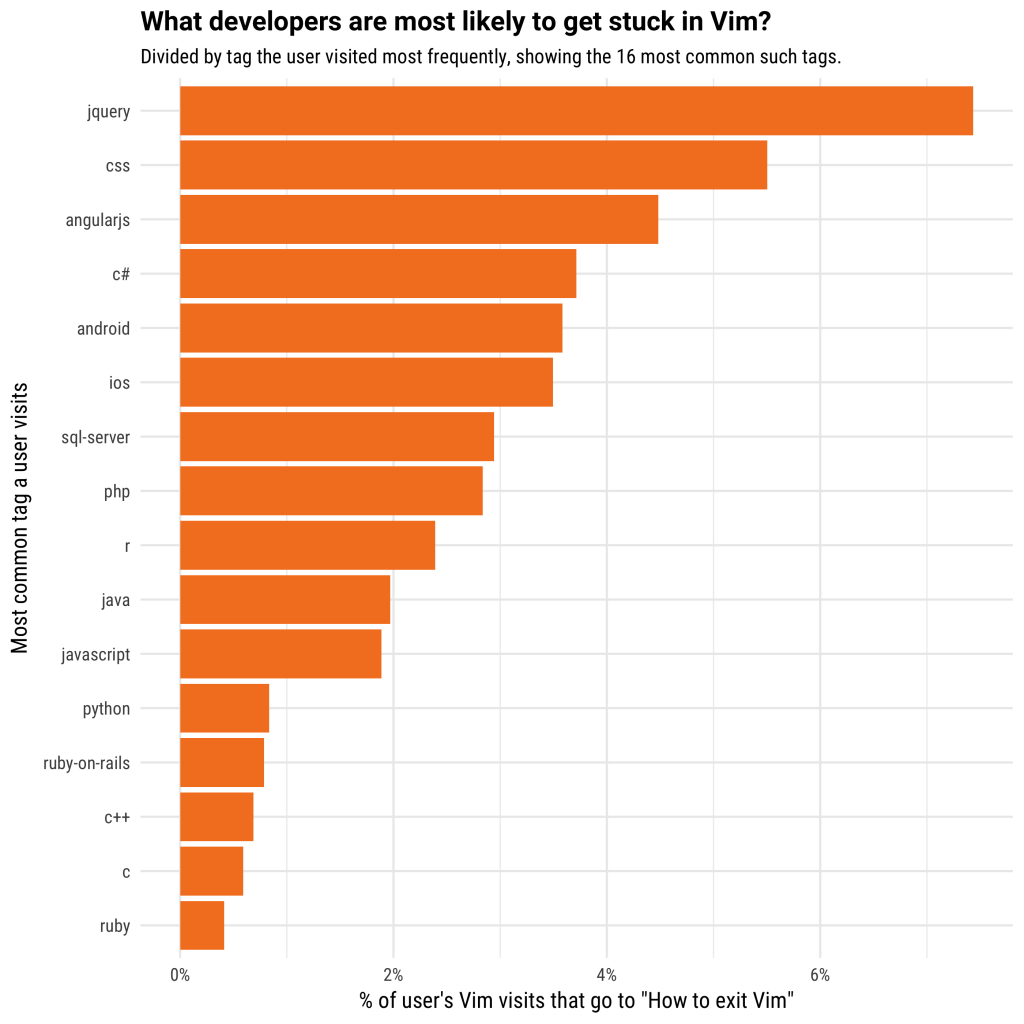Stack Overflow Withdraws More Than One Million Users From Vim
- Transfer
One of these days one popular question on Stack Overflow celebrated its anniversary millionth viewing.

You are not alone, jclancy. In the five years that have passed since this post was published, more than a million other developers suffered the same fate - they were stuck in Vim and could not get out without any help. No wonder the IT community has so many jokes about how hard it is to find a way out of this editor.

From experienced Vim users, I heard that the editor does not deserve such a reputation, and they are probably right (even I myself dealt with this problem in the last couple of years). I think there are two reasons why people constantly forget how to get out of Vim. Firstly, developers are usually thrown to Vim from the console or as a result of some other unforeseen situation; secondly, this does not happen too often, so that they have time to forget how they got out of the situation last time.
To celebrate this event, let's look at the statistics. In particular, let’s try to figure out who most often gets stuck in Vim, and doesn’t happen to be there intentionally, and see how these categories are distributed by country and programming language.
How many people have problems logging out of Vim?
Last year, about 0.05% of the total number of views was related to questions like “ How to exit the Vim editor? "; this means that every 20,000 visitors came to the site with this particular problem. In other words, on weekdays during the hours when traffic reaches a peak, approximately 80 people per hour need help getting out of Vim.
Has this percentage changed over time? That is, can we say that developers are gradually mastering this function on their own?

Something is not like. The question appeared on the site in August 2012, for the first few months the number of views was very low. Then the traffic began to grow steadily and for two years remained on the rise - probably the page rose to the first lines of search results and third-party resources began to link to it. In the next two years, the growth was quite stable. Of course, it does not follow from this that the same people go to the page over and over again - perhaps these are new programmers who have come to this situation for the first time.
Country Statistics
As we mentioned in a previous postStack Overflow traffic analysis provides a lot to learn about the geographic distribution of developers. Let's see what percentage of the questions is about the exit from the total number of posts related to Vim for each country. We assume that in countries where there are many experienced Vim users, the percentage will be low. Large values, on the contrary, indicate that many developers fall into Vim unexpectedly for themselves.

As you can see, programmers from Ukraine, Turkey and Indonesia are often stuck in this editor: they have more questions about Vim directly related to leaving the program than all other states. At the opposite end of the spectrum are China, Korea and Japan - they have a percentage of such requests less than a good ten times. From this, apparently, it should be concluded that the developers from these countries do not come into Vim by chance and have a good idea of what to do to exit.
What languages do those who cannot cope with Vim write?
It also seems logical that the experience in which the programmer writes the code will influence the experience with Vim. We can test this hypothesis as follows: we divide users into groups according to the main programming technology and look at the average percentage ratio of “questions on leaving Vim” / “questions on Vim” for each group.
We will determine the main programming technology based on which tag on the Stack Overflow the user visits most often (say, in my case, the most popular tag is R, it accounts for 52% of views). The method is not ideal, but reliable enough to outline the distribution of languages. For this part of the analysis, we included only registered users with more than 100 site views in the sample.

Most often, front-end developers - that is, those who primarily view JQuery, CSS, and AngularJS tags - are having difficulty leaving Vim. They are followed by developers on Microsoft (C # and SQL Server) and mobile developers (Android and iOS). They work mostly with integrated development environments (Visual Studio, Eclipse, Xcode, and so on), rather than simple text editors, so it is not surprising that they are more likely to accidentally get into Vim than to open it intentionally.
Developers who are least likely to get stuck write in C, C ++, Python, and Ruby. This list, in my opinion, is quite natural: it is a mixture of low-level and scripting languages, which usually involve a simple text editor without a graphical shell. Accordingly, those who work with these languages have enough experience to get out of Vim without resorting to Google.
Conclusion
When I saw that the number of views of the question approached the mark of a million, it amused me, but at the same time, I was proud to work (and, among other things, answer questions) on a site that turned out to be useful to such a huge the number of developers. Just think: the answer you are offering can help millions of people, no matter what they are talking about - canceling a command in gitor using the yield keyword in Python .
If you also want to contribute, we invite you to join the largest community of developers in the world in any role that suits you - ask questions and offer answers, get a job or make a name online by publishing your story . You can also use our tools, for example, Stack Overflow Trends , which will allow you to learn a lot about software developers.
In any case, the next time you solve the problem thanks to Stack Overflow, do not forget that thousands of users ask questions daily, post answers, edit and moderate posts to give you such an opportunity.

You are not alone, jclancy. In the five years that have passed since this post was published, more than a million other developers suffered the same fate - they were stuck in Vim and could not get out without any help. No wonder the IT community has so many jokes about how hard it is to find a way out of this editor.

From experienced Vim users, I heard that the editor does not deserve such a reputation, and they are probably right (even I myself dealt with this problem in the last couple of years). I think there are two reasons why people constantly forget how to get out of Vim. Firstly, developers are usually thrown to Vim from the console or as a result of some other unforeseen situation; secondly, this does not happen too often, so that they have time to forget how they got out of the situation last time.
To celebrate this event, let's look at the statistics. In particular, let’s try to figure out who most often gets stuck in Vim, and doesn’t happen to be there intentionally, and see how these categories are distributed by country and programming language.
How many people have problems logging out of Vim?
Last year, about 0.05% of the total number of views was related to questions like “ How to exit the Vim editor? "; this means that every 20,000 visitors came to the site with this particular problem. In other words, on weekdays during the hours when traffic reaches a peak, approximately 80 people per hour need help getting out of Vim.
Has this percentage changed over time? That is, can we say that developers are gradually mastering this function on their own?

Something is not like. The question appeared on the site in August 2012, for the first few months the number of views was very low. Then the traffic began to grow steadily and for two years remained on the rise - probably the page rose to the first lines of search results and third-party resources began to link to it. In the next two years, the growth was quite stable. Of course, it does not follow from this that the same people go to the page over and over again - perhaps these are new programmers who have come to this situation for the first time.
Country Statistics
As we mentioned in a previous postStack Overflow traffic analysis provides a lot to learn about the geographic distribution of developers. Let's see what percentage of the questions is about the exit from the total number of posts related to Vim for each country. We assume that in countries where there are many experienced Vim users, the percentage will be low. Large values, on the contrary, indicate that many developers fall into Vim unexpectedly for themselves.

As you can see, programmers from Ukraine, Turkey and Indonesia are often stuck in this editor: they have more questions about Vim directly related to leaving the program than all other states. At the opposite end of the spectrum are China, Korea and Japan - they have a percentage of such requests less than a good ten times. From this, apparently, it should be concluded that the developers from these countries do not come into Vim by chance and have a good idea of what to do to exit.
What languages do those who cannot cope with Vim write?
It also seems logical that the experience in which the programmer writes the code will influence the experience with Vim. We can test this hypothesis as follows: we divide users into groups according to the main programming technology and look at the average percentage ratio of “questions on leaving Vim” / “questions on Vim” for each group.
We will determine the main programming technology based on which tag on the Stack Overflow the user visits most often (say, in my case, the most popular tag is R, it accounts for 52% of views). The method is not ideal, but reliable enough to outline the distribution of languages. For this part of the analysis, we included only registered users with more than 100 site views in the sample.

Most often, front-end developers - that is, those who primarily view JQuery, CSS, and AngularJS tags - are having difficulty leaving Vim. They are followed by developers on Microsoft (C # and SQL Server) and mobile developers (Android and iOS). They work mostly with integrated development environments (Visual Studio, Eclipse, Xcode, and so on), rather than simple text editors, so it is not surprising that they are more likely to accidentally get into Vim than to open it intentionally.
Developers who are least likely to get stuck write in C, C ++, Python, and Ruby. This list, in my opinion, is quite natural: it is a mixture of low-level and scripting languages, which usually involve a simple text editor without a graphical shell. Accordingly, those who work with these languages have enough experience to get out of Vim without resorting to Google.
Conclusion
When I saw that the number of views of the question approached the mark of a million, it amused me, but at the same time, I was proud to work (and, among other things, answer questions) on a site that turned out to be useful to such a huge the number of developers. Just think: the answer you are offering can help millions of people, no matter what they are talking about - canceling a command in gitor using the yield keyword in Python .
If you also want to contribute, we invite you to join the largest community of developers in the world in any role that suits you - ask questions and offer answers, get a job or make a name online by publishing your story . You can also use our tools, for example, Stack Overflow Trends , which will allow you to learn a lot about software developers.
In any case, the next time you solve the problem thanks to Stack Overflow, do not forget that thousands of users ask questions daily, post answers, edit and moderate posts to give you such an opportunity.
